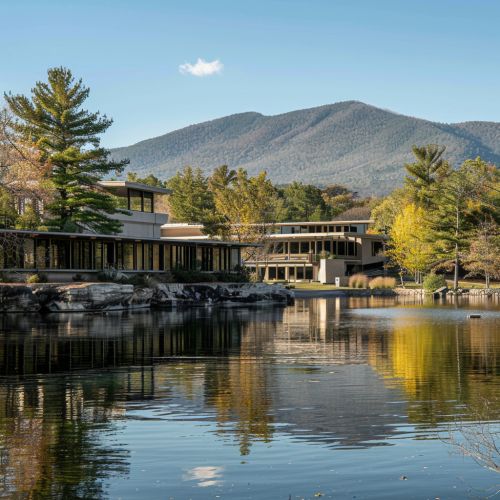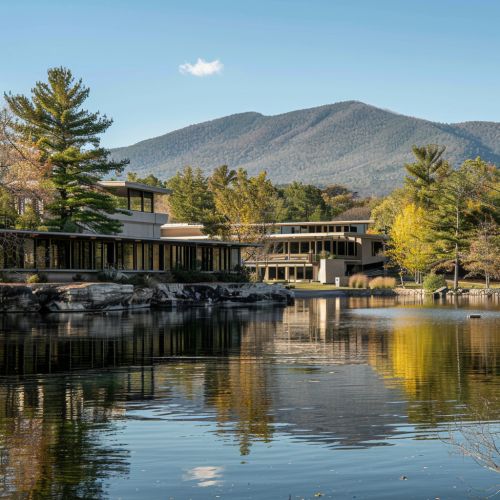Black Mountain College
History
Black Mountain College was an experimental college founded in 1933 in Black Mountain, North Carolina. The institution was established by John Andrew Rice, Theodore Dreier, and other former faculty members of Rollins College. The college was notable for its progressive approach to education, emphasizing the arts as central to the learning experience. It operated until 1957, leaving a lasting impact on the fields of art, music, and education.
Founding and Early Years
The college was founded during the Great Depression, a period marked by economic hardship and social change. John Andrew Rice, a former professor at Rollins College, spearheaded the creation of Black Mountain College after being dismissed from Rollins due to his unconventional teaching methods. Rice, along with Theodore Dreier and other like-minded educators, sought to create an institution that valued creativity, critical thinking, and community.
The founders were influenced by the educational philosophies of John Dewey, who advocated for experiential learning and the integration of the arts into the curriculum. The college's initial campus was located at the Blue Ridge Assembly, a YMCA conference center in Black Mountain, North Carolina. The first class consisted of just 13 students and a handful of faculty members.
The Lake Eden Campus
In 1941, the college moved to a new location at Lake Eden, a former summer camp. The new campus provided more space and facilities, allowing the college to expand its programs and attract a larger student body. The Lake Eden campus featured buildings designed by faculty member and architect Walter Gropius, a founder of the Bauhaus school in Germany. The architecture of the campus reflected the college's commitment to modernist principles and functional design.


Educational Philosophy
Black Mountain College was founded on the belief that the arts are central to the experience of learning. The college's curriculum was interdisciplinary, combining the study of the arts, humanities, and sciences. This approach was influenced by the educational theories of John Dewey, who emphasized the importance of experiential learning and the integration of different fields of study.
Interdisciplinary Approach
The college's interdisciplinary approach allowed students to explore a wide range of subjects and encouraged collaboration between different disciplines. For example, a student studying visual arts might also take courses in literature, philosophy, and natural sciences. This holistic approach to education aimed to develop well-rounded individuals who could think critically and creatively.
Emphasis on the Arts
The arts were a central focus at Black Mountain College, and the institution attracted many prominent artists and musicians as faculty members. Notable figures included Josef Albers, a former Bauhaus instructor who taught at the college from 1933 to 1949, and John Cage, an avant-garde composer who was a visiting faculty member. The college also hosted summer institutes that featured workshops and performances by leading artists and musicians.
Community and Collaboration
Community and collaboration were key aspects of the Black Mountain College experience. Students and faculty lived and worked together, creating a close-knit community that fostered mutual respect and cooperation. The college operated on a democratic model, with students and faculty participating in decision-making processes. This collaborative environment encouraged experimentation and innovation.
Notable Faculty and Alumni
Black Mountain College attracted a diverse and talented group of faculty and students, many of whom went on to achieve significant recognition in their respective fields.
Faculty
- Josef Albers: A former Bauhaus instructor, Albers was a key figure in the development of the college's art program. He taught at Black Mountain College from 1933 to 1949 and later became a prominent figure in American art education.
- John Cage: An avant-garde composer and music theorist, Cage was a visiting faculty member at the college. He is known for his experimental compositions and innovative use of chance in music.
- Merce Cunningham: A pioneering choreographer and dancer, Cunningham was associated with the college and collaborated with John Cage on several projects.
- Buckminster Fuller: An architect, inventor, and futurist, Fuller taught at the college and conducted experiments in geodesic dome construction.
Alumni
- Robert Rauschenberg: A prominent American artist, Rauschenberg studied at Black Mountain College and later became known for his innovative use of mixed media and collage.
- Cy Twombly: An influential painter and sculptor, Twombly attended the college and developed a distinctive style characterized by abstract forms and calligraphic marks.
- Ruth Asawa: A renowned sculptor, Asawa studied at the college and is known for her intricate wire sculptures and public art installations.
- Charles Olson: A poet and essayist, Olson was associated with the college and later became a leading figure in the Black Mountain poets movement.
Legacy and Impact
Although Black Mountain College closed in 1957, its influence on the fields of art, music, and education has been profound. The college's emphasis on interdisciplinary learning, experiential education, and the integration of the arts into the curriculum has inspired numerous educational institutions and programs.
Influence on Art and Music
The college played a significant role in the development of modern art and music in the United States. Many of the artists and musicians associated with the college went on to achieve international recognition and influence. The college's experimental and collaborative approach to the arts helped to shape the direction of contemporary art and music.
Educational Innovations
Black Mountain College's innovative educational practices have had a lasting impact on the field of education. The college's emphasis on experiential learning, interdisciplinary study, and community involvement has influenced the development of progressive education models. Many of the principles and practices pioneered at Black Mountain College have been adopted by other institutions and continue to inform contemporary educational theory and practice.
